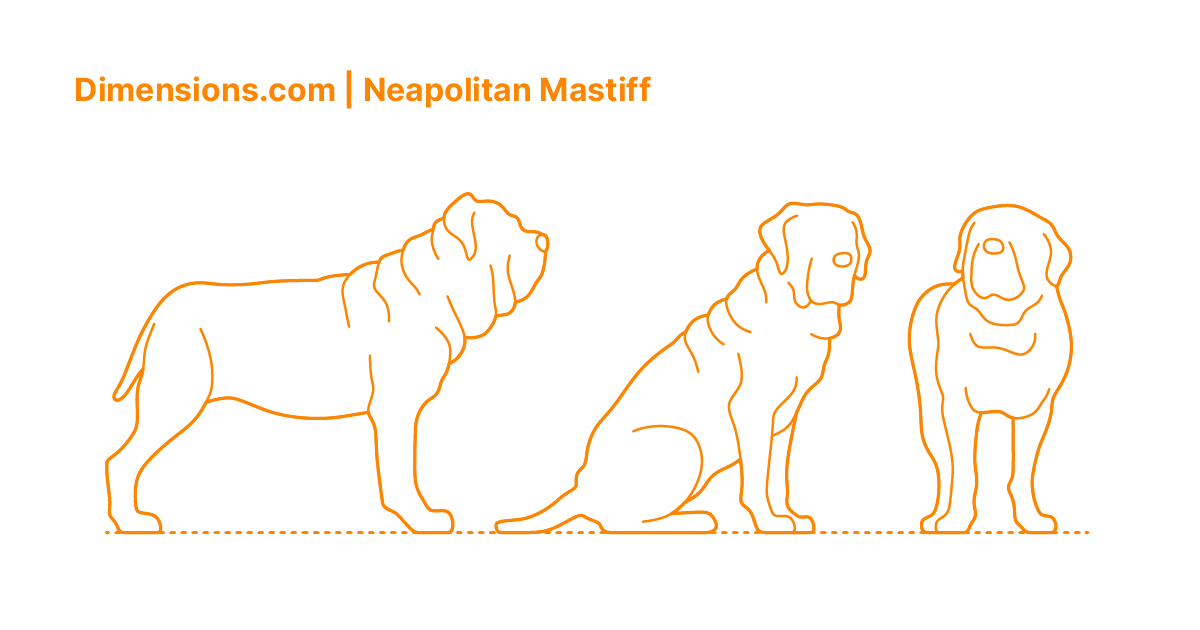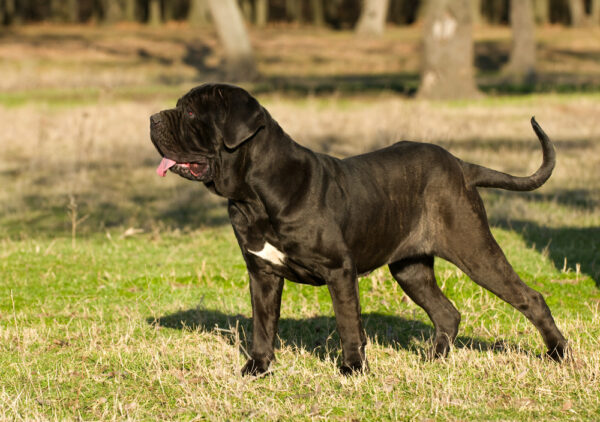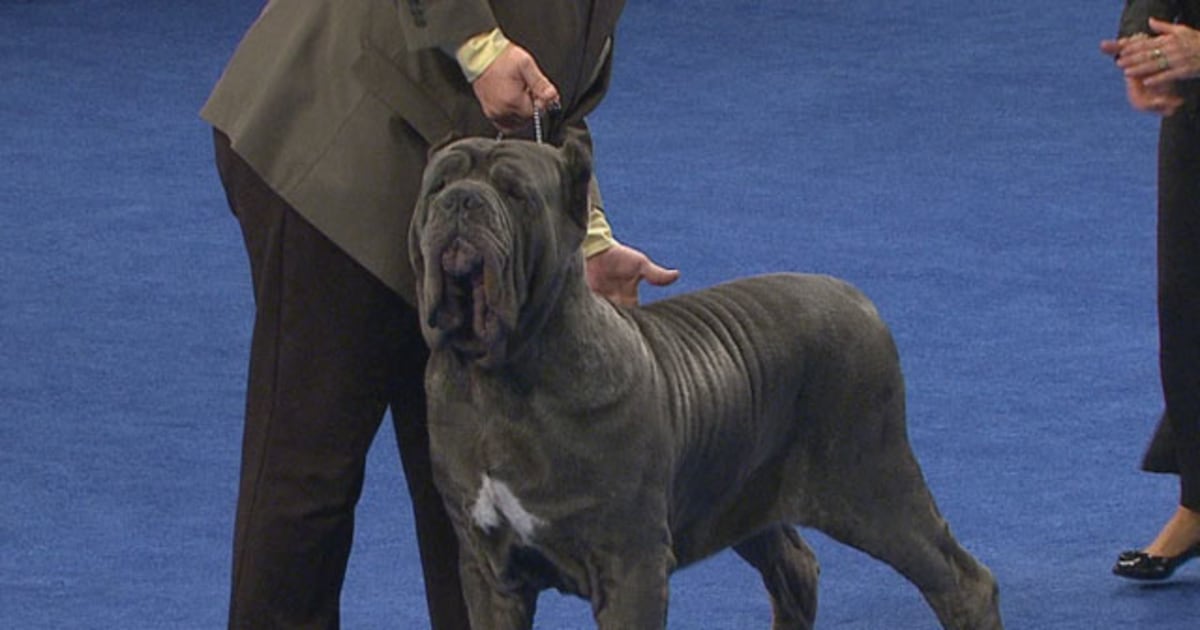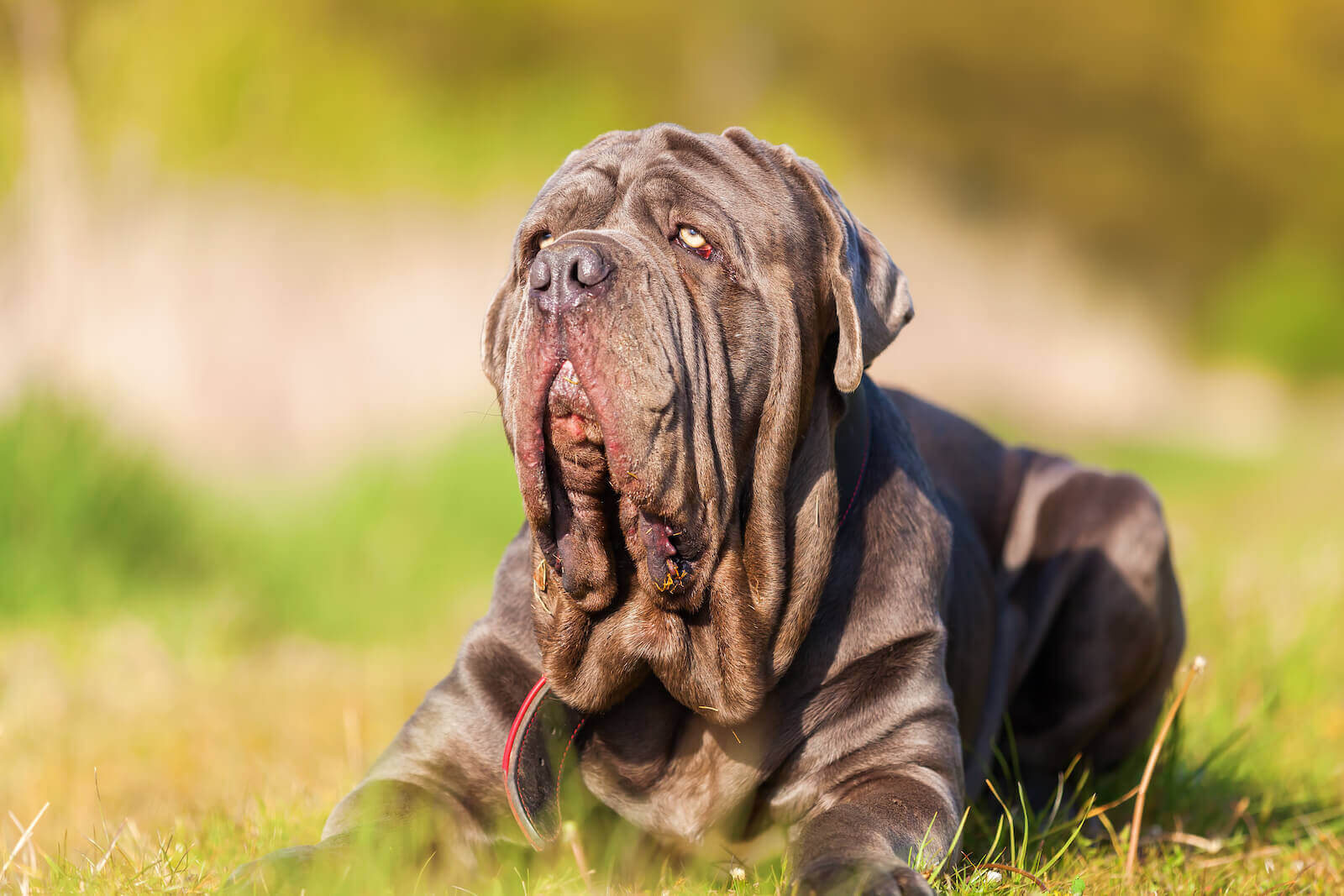The Neapolitan Mastiff, also known as the Mastino Napoletano, is a large and powerful dog breed with a long and distinguished history. These dogs were originally bred in southern Italy as guardians and protectors of property and livestock. Today, they are still highly valued for their loyalty, intelligence, and gentle temperament. In this article, we will take a closer look at the appearance, temperament, health, training, and history of the Neapolitan Mastiff.
Appearance

Neapolitan Mastiffs are one of the largest dog breeds, with males typically weighing between 150 and 200 pounds and standing 26 to 31 inches tall at the shoulder. Females are slightly smaller, weighing between 110 and 150 pounds and standing 24 to 28 inches tall at the shoulder. These dogs have a massive head with a short, broad muzzle and deep wrinkles. Their eyes are small and set deep in their sockets, and their ears are floppy and hang down close to their face. Neapolitan Mastiffs have a thick, heavy coat that is typically black, gray, or brindle.
Head and Body
The head of a Neapolitan Mastiff is one of its most distinctive features. It is large and square-shaped, with a short, broad muzzle and deep wrinkles. The forehead is flat and wide, and the cheeks are well-developed. The stop (the indentation between the muzzle and the skull) is moderate but clearly defined. The nose is large and black, and the lips are thick and pendulous. The jaws are powerful and capable of delivering a strong bite.
The body of a Neapolitan Mastiff is massive and muscular, with a broad chest and a deep, wide chest. The back is straight and strong, and the hindquarters are well-developed. The tail is thick and set high, but it is usually docked to a length of 2-3 inches. In some countries, docking is illegal, and the tail is left natural.
Coat and Color
Neapolitan Mastiffs have a short and dense coat that is smooth to the touch. It is not overly soft or fluffy, but it provides good protection against the elements. The coat can come in various colors, including black, gray, and brindle. Some dogs may also have white markings on their chest and toes. The coat requires minimal grooming, with occasional brushing to remove dead hair and keep it looking neat.
Temperament

Despite their intimidating size, Neapolitan Mastiffs are gentle and affectionate dogs. They are known for their loyalty and devotion to their families. However, they can be protective and territorial, making them excellent guard dogs. Early socialization and training are essential to ensure that they do not become overly aggressive towards strangers or other animals.
Loyalty and Affection
Neapolitan Mastiffs are incredibly loyal and devoted to their owners. They form strong bonds with their families and will do anything to protect them. This trait makes them excellent guard dogs, as they will not hesitate to defend their loved ones if they feel threatened. However, this loyalty can also lead to separation anxiety if they are left alone for extended periods. They thrive on human companionship and should not be left alone for long periods.
Intelligence and Trainability
Neapolitan Mastiffs are intelligent and trainable, but they can also be stubborn at times. They respond well to positive reinforcement techniques, such as praise, treats, and playtime. Harsh training methods or physical punishment should be avoided, as these dogs can become defensive and uncooperative. Early socialization and training are crucial to ensure that they grow up to be well-behaved and well-adjusted dogs.
Good with Children
Neapolitan Mastiffs are generally good with children, but they should always be supervised when around young kids. Due to their large size and protective nature, they may accidentally knock over small children while playing. It is also essential to teach children how to interact with dogs respectfully and safely. As with any dog breed, it is crucial to supervise all interactions between children and Neapolitan Mastiffs to prevent any accidents.
Health

Like all dog breeds, Neapolitan Mastiffs are prone to certain health issues. However, responsible breeders will perform health screenings on their breeding stock to reduce the risk of passing on genetic diseases to their offspring. Some of the health concerns that can affect Neapolitan Mastiffs include:
- Hip and elbow dysplasia: This is a common condition in large dog breeds where the hip or elbow joint does not develop correctly, causing pain and mobility issues.
- Bloat: Also known as gastric dilatation-volvulus (GDV), this is a life-threatening condition where the stomach fills with gas and twists on itself, cutting off blood flow to vital organs.
- Eye problems: Neapolitan Mastiffs are prone to various eye conditions, including entropion (inward rolling of the eyelid) and cherry eye (prolapse of the third eyelid).
- Skin problems: Due to their deep wrinkles, Neapolitan Mastiffs are susceptible to skin infections and irritations. Regular cleaning and maintenance of their wrinkles are necessary to prevent these issues.
It is essential to work closely with a reputable breeder and a trusted veterinarian to ensure that your Neapolitan Mastiff remains healthy and happy throughout its life.
Training

Training a Neapolitan Mastiff requires patience, consistency, and positive reinforcement techniques. These dogs respond well to praise, treats, and playtime, so use these as rewards for good behavior. Early socialization is crucial to ensure that they are comfortable around other people and animals. It is also essential to establish yourself as the pack leader from a young age, as these dogs can become dominant if not properly trained.
Socialization
Socialization is the process of exposing your dog to different people, animals, and environments in a positive and controlled way. This helps them learn how to interact with the world around them and prevents fear or aggression towards new situations. Early socialization is crucial for Neapolitan Mastiffs, as they can be wary of strangers and may become aggressive if not exposed to different people and animals from a young age.
Obedience Training
Obedience training is essential for all dogs, and Neapolitan Mastiffs are no exception. These dogs are intelligent and trainable, but they can also be stubborn at times. Consistency and patience are key when training a Neapolitan Mastiff. Positive reinforcement techniques, such as praise, treats, and playtime, work best with this breed. Harsh training methods or physical punishment should be avoided, as they can cause these dogs to become defensive and uncooperative.
Exercise and Mental Stimulation
Neapolitan Mastiffs are not overly active dogs, but they do require daily exercise to stay healthy and happy. A couple of short walks or play sessions per day should be enough to keep them physically fit. Mental stimulation is also crucial for this breed, as they are intelligent and need mental challenges to prevent boredom and destructive behaviors. Puzzle toys, training sessions, and interactive games are great ways to provide mental stimulation for your Neapolitan Mastiff.
History
The Neapolitan Mastiff has a long and distinguished history dating back to ancient Rome. They were originally bred as war dogs and used by the Roman army in battle. After the fall of the Roman Empire, these dogs found their way to southern Italy, where they were used as guardians and protectors of property and livestock. They were also used as fighting dogs in the Colosseum, but this practice was eventually banned.
In the 1940s, a group of Italian dog fanciers formed the Society for the Protection of the Neapolitan Mastiff to preserve and promote the breed. In 1949, the first breed standard was established, and the Neapolitan Mastiff was officially recognized by the Italian Kennel Club. The breed was introduced to the United States in the 1970s and was recognized by the American Kennel Club in 2004.
Conclusion
The Neapolitan Mastiff is a gentle giant with a long and distinguished history. These dogs are loyal, affectionate, and intelligent, making them excellent companions and guardians. However, they require early socialization and training to ensure that they grow up to be well-behaved and well-adjusted dogs. With proper care, these majestic dogs can make a loving and devoted addition to any family.